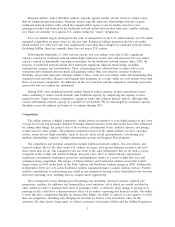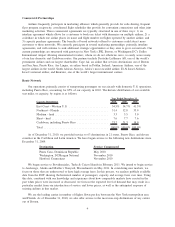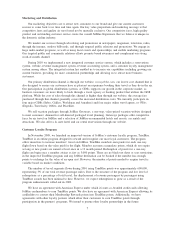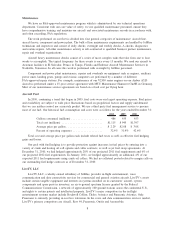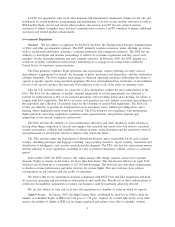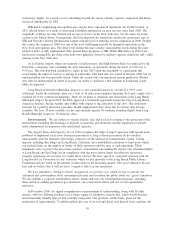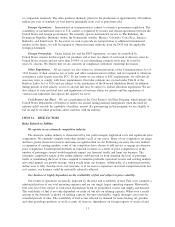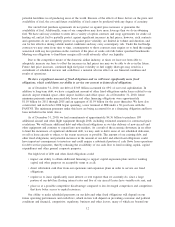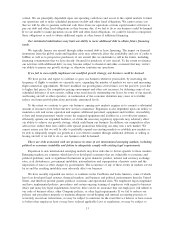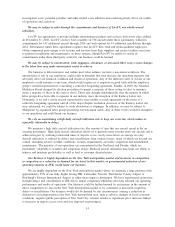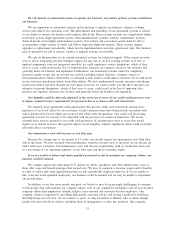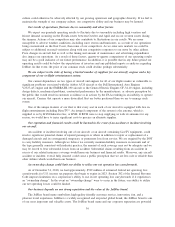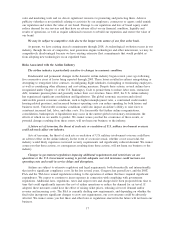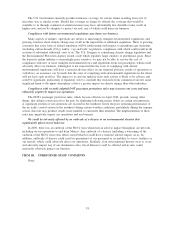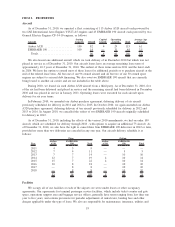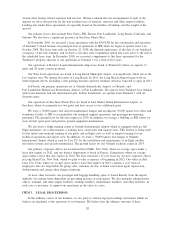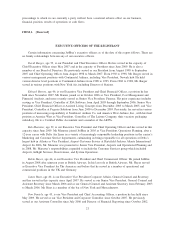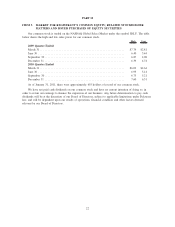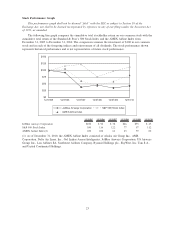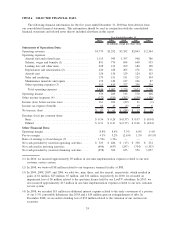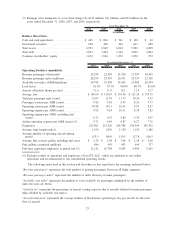JetBlue Airlines 2010 Annual Report Download - page 24
Download and view the complete annual report
Please find page 24 of the 2010 JetBlue Airlines annual report below. You can navigate through the pages in the report by either clicking on the pages listed below, or by using the keyword search tool below to find specific information within the annual report.We rely heavily on automated systems to operate our business; any failure of these systems could harm
our business.
We are dependent on automated systems and technology to operate our business, enhance customer
service and achieve low operating costs. The performance and reliability of our automated systems is critical
to our ability to operate our business and compete effectively. These systems include our computerized airline
reservation system, flight operations system, telecommunications systems, website, maintenance systems,
check-in kiosks and in-flight entertainment systems. Our website and reservation system must be able to
accommodate a high volume of traffic and deliver important flight information. These systems require
upgrades or replacement periodically, which involve implementation and other operational risks. Our business
may be harmed if we fail to operate, replace or upgrade systems successfully.
We rely on the providers of our current automated systems for technical support. If the current provider
were to fail to adequately provide technical support for any one of our key existing systems or if new or
updated components were not integrated smoothly, we could experience service disruptions, which, if they
were to occur, could result in the loss of important data, increase our expenses, decrease our revenues and
generally harm our business and reputation. Furthermore, our automated systems cannot be completely
protected against events that are beyond our control, including natural disasters, computer viruses or
telecommunications failures. Substantial or sustained system failures could impact customer service and result
in our customers purchasing tickets from other airlines. We have implemented security measures and change
control procedures and have disaster recovery plans; however, we cannot assure you that these measures are
adequate to prevent disruptions, which, if they were to occur, could result in the loss of important data,
increase our expenses, decrease our revenues and generally harm our business and reputation.
Our liquidity could be adversely impacted in the event one or more of our credit card processors were
to impose material reserve requirements for payments due to us from credit card transactions.
We currently have agreements with organizations that process credit card transactions arising from
purchases of air travel tickets by our customers. Credit card processors have financial risk associated with
tickets purchased for travel which can occur several weeks after the purchase. Our credit card processing
agreements provide for reserves to be deposited with the processor in certain circumstances. We do not
currently have reserves posted for our credit card processors. If circumstances were to occur that would
require us to deposit reserves, the negative impact on our liquidity could be significant which could materially
adversely affect our business.
Our maintenance costs will increase as our fleet ages.
Because the average age of our aircraft is 5.4 years, our aircraft require less maintenance now than they
will in the future. We have incurred lower maintenance expenses because most of the parts on our aircraft are
under multi-year warranties. Our maintenance costs will increase significantly, both on an absolute basis and
as a percentage of our operating expenses, as our fleet ages and these warranties expire.
If we are unable to attract and retain qualified personnel or fail to maintain our company culture, our
business could be harmed.
We compete against the other major U.S. airlines for pilots, mechanics and other skilled labor; some of
them offer wage and benefit packages that exceed ours. We may be required to increase wages and/or benefits
in order to attract and retain qualified personnel or risk considerable employee turnover. If we are unable to
hire, train and retain qualified employees, our business could be harmed and we may be unable to implement
our growth plans.
In addition, as we hire more people and grow, we believe it may be increasingly challenging to continue
to hire people who will maintain our company culture. One of our competitive strengths is our service-oriented
company culture that emphasizes friendly, helpful, team-oriented and customer-focused employees. Our
company culture is important to providing high quality customer service and having a productive workforce
that helps keep our costs low. As we continue to grow, we may be unable to identify, hire or retain enough
people who meet the above criteria, including those in management or other key positions. Our company
15


